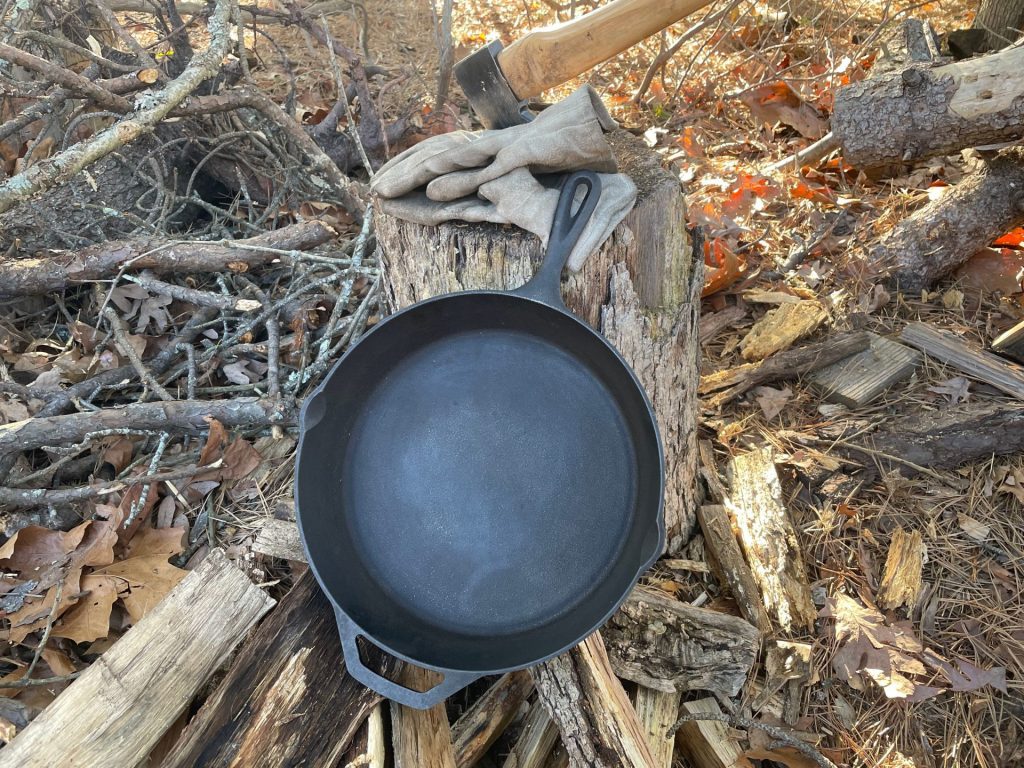
“As iron sharpens iron, so one person sharpens another.” ~Proverbs
Buckle up and get ready for the longest-winded vindication of cast iron camp cookware you’ve ever read, because I’m ready to go on a tear.
If there’s one thing I hate, it’s consumerism. You do you, but don’t expect me to follow suit. And don’t expect me to keep my mouth shut if you ask me about it.
I mean, I know you didn’t ask me about it, but you are here, so you must have been looking for something relevant to cast iron. So really, you did sort of ask, and I am ready to answer.
Items are made from resources. Resources have inherent value. This is one of the reasons I go into such detail on steel chemistry in my knife and tool reviews, and why I so hotly advocated for full grain leather in my “Leather Boot Care 101” article.
Cast iron camp cookware is, simply put, at a distinct advantage over whatever lightweight nonsensical snobbery you’ve been sold by the folks at REI (yes, I know REI sells cast iron, I’m just making a point).
I am sick and bloody tired of the memes I’ve seen by people about how cast iron is heavy and you “can’t clean it.”
These memes are idyllic beacons of what intellectual stagnation and cultural, mechanical and functional illiteracy look like.
Yes, weight is the one conceivable disadvantage that cast iron carries, but that is literally it. And it comes with so many distinct advantages that you can drown it entirely in a sea of benefits of such profundity that it would no longer even register as a drawback in the minds of reasonable humans.
As for the fact that you can’t clean it – you can’t clean it?! You mean you can’t put soap on it. You can’t put soap in your car’s tank, either, if you want it to run. You also can’t drink soap when you’re thirsty or fill your pen with soap when it runs out of ink.
Cast iron, like literally every other good, requires special care and maintenance. It shares this in common with everything you own, from your shoes to your home. If you don’t like that, find a new reality to occupy – evidently, this one’s not for you.
Now that I’ve gotten that off my chest, let’s talk about the glaringly obvious reasons that cast iron camp cookware is the best camp cookware there is, period.
Even Heat Distribution: Holds Heat Well, No Hot Spots
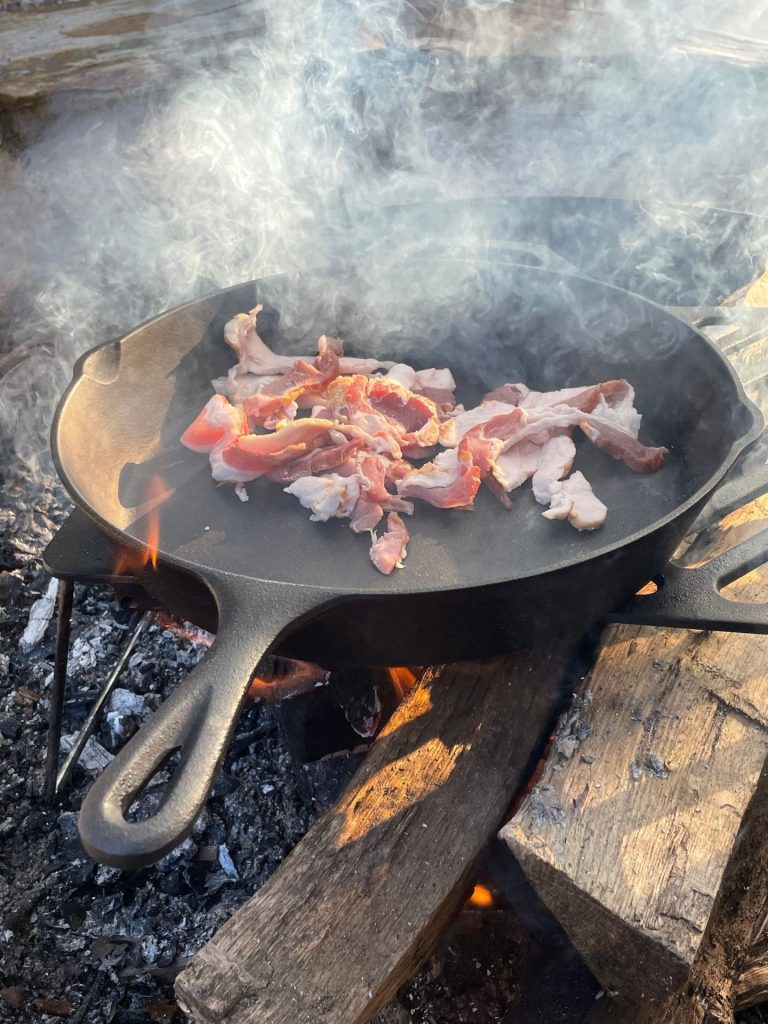
One of the great things about cast iron cookware of all sorts, not just camp cookware, is that it is thick, dense and heats evenly. You are not going to get hot spots on cast iron.
Iron is an excellent conductor of heat, so when you place it on a burner or over the coals, the whole thing is going to heat up nice and evenly, all the way up the sides of the pan and through the handle.
Also, cast iron cookware, being heavier than other flimsy thin aluminum pans (and similar cookware) will hold that heat better, so if you throw a steak on there, you can expect a nice sear. It also won’t drastically drop the temperature of the pan.
All in all, better for searing, baking, and all other forms of cooking that I can possibly imagine, even over the unforgiving coals of a campfire, where it’s tough as it is to control the temperature.
It’s Naturally Non-Stick
Don’t buy the offensive drivel issuing from the mouths and pamphlets. Those “non-stick” pans you can buy any old place are low quality and if they are non-stick at all, it is for the first two sessions of use.
After that, they are temperamental, difficult to clean, and most irritatingly, not non-stick.
Cast iron that is well seasoned is naturally non-stick. Now, when I say non-stick, I am not blowing smoke. I have cooked like 12 eggs in a cast iron skillet, over a bed of coals, with basically no oil, and poured them out of the pan with no help when they were done cooking.
That’s how non-stick cast iron is.
And it doesn’t even entail whatever carcinogenic compounds they use to make non-stick cookware. Not that that bothers me anyway, but I just cut out the middleman and use cast iron, which works better, is cheaper, and entails less work.
You can pay more and work harder if you want to but that’s not for me.
It’s Basically Maintenance Free
Cast iron cookware needs little to no maintenance. The only true maintenance it really needs is seasoning to protect it against rusting, which is a non-issue as soon as the pan is seasoned. In fact, once it’s seasoned you can put it away “dirty” and it still won’t rust.
To season a cast iron pan (and most of them come seasoned anyway) all you need to do is rub it with cooking oil and heat it in an oven or over a bed of coals. You can tell it’s seasoned when it has a nice glossy sheen to it.
Once it’s seasoned, all you need to do is make sure there are no breaks in the oil coating (that is, it doesn’t burn or wear off) and you’re good to go.
Truth be told, you could put cast iron cookware away caked in bits of food and as long as it was previously well-seasoned with oil, you’ll never experience any ill effects.
It Is Easier to Clean Than Other Types of Cookware
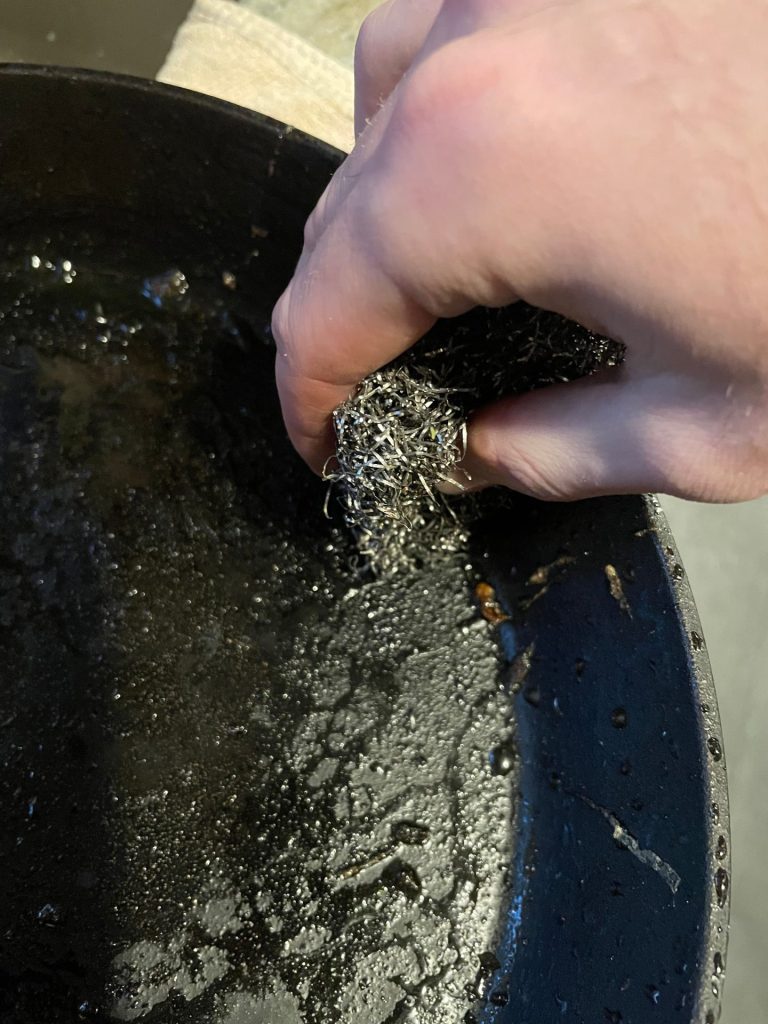
If you leave bits of food caked onto your other cookware, every time you cook with them, you’re baking that food onto the surface and ultimately making it harder to clean off.
With cast iron, this is hardly an issue. You can put a cast iron pan in the fire and let the fire literally burn whatever scraps are left on the pan to carbon.
Of course, I don’t necessarily advocate for that, but it is a viable solution.
Even if not, cast iron is easy to clean. As I stated, once seasoned it doesn’t even need to be. But if you choose to clean it, it’s a very simple process.
Since these pans are not coated in finicky finishes, you can take a piece of chainmail and scrub them clean with unholy force. That is hardly an exaggeration; there are companies that quite literally produce squares of chain mail for scrubbing cast iron clean.
As for me, I prefer a slightly lower-tech solution: a bit of soap-less steel wool.
It is simple, it is effective, and the main component is elbow grease. Believe me, with a piece of steel wool and a healthy dose of determination, you can get cast iron clean, whatever was on it.
You can’t do that with light, thin cookware with expensive coatings, because they will either scratch or you will ruin them outright. Cast iron cookware, however, begs to be handled roughly and comes out the better for it. You’ll get winded before cast iron does.
Some lament the fact that you can’t use soap on cast iron. I rejoice in the fact that you don’t need to. It’s way easier this way.
All soap will do is strip off the protective coating of oil. I don’t understand why some people don’t appreciate that. The seasoning coating on the pan protects it and never needs to be stripped away.
To some, it probably seems unhygienic. But break this down with me. Every time you cook on the pan, you’re heating it up to several hundred degrees. It’s completely clean and sterile. Besides, one of the oldest ways to preserve meat was by potting, which is basically preservation in oil.
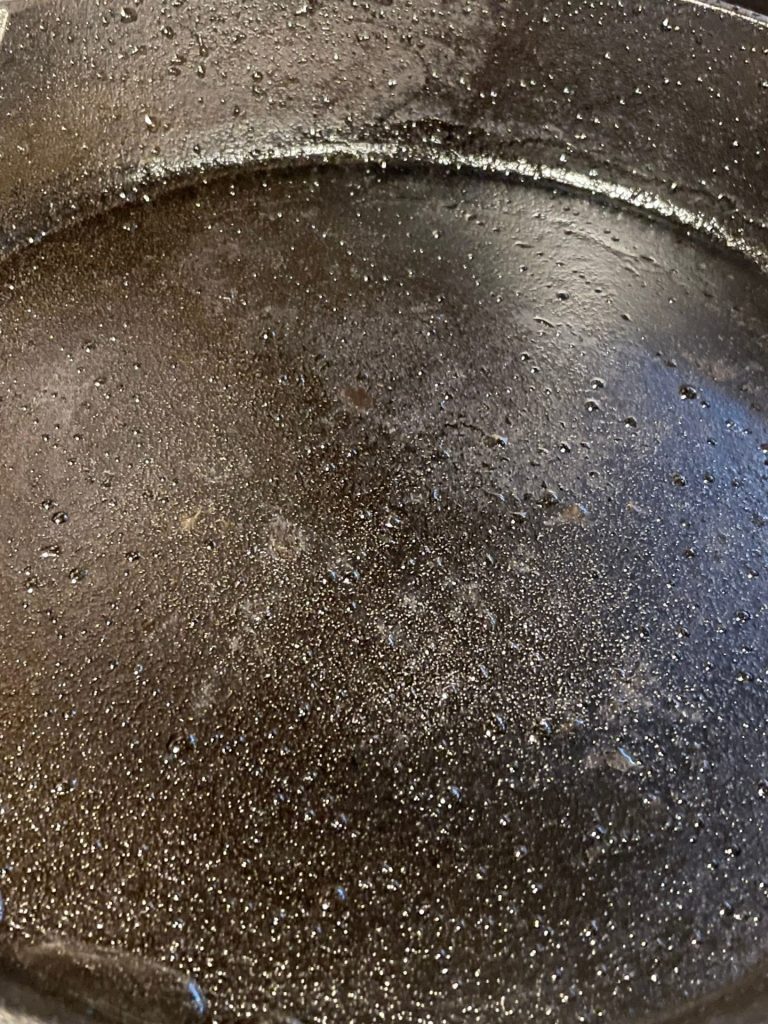
Oil doesn’t easily engender the growth of microbes; water does. You’re good to go with your iron pan.
One more thing to mention here, which is the use of coarse salt.
I have read that some people use rock salt as an abrasive to clean their cast iron pans. I am sure that it works, but I don’t know why you’d want to do that.
Salt is a great abrasive since it is very hard. I can’t argue with that. But salt is also a hygroscopic compound and it is a catalyst for oxidation.
That is like, you know, literally the thing you are trying to prevent here.
Why would you cover your cast iron pan in the very thing that will attract moisture and accelerate corrosion?
If you are very meticulous about it, as long as you get all the salt off after you use it, you’re good to go.
But I say, hedge your bets, don’t use salt, and just use steel wool. That way you won’t lose any sleep after washing your pans, wondering if you got all that salt off of them.
You Can Use Metal on It
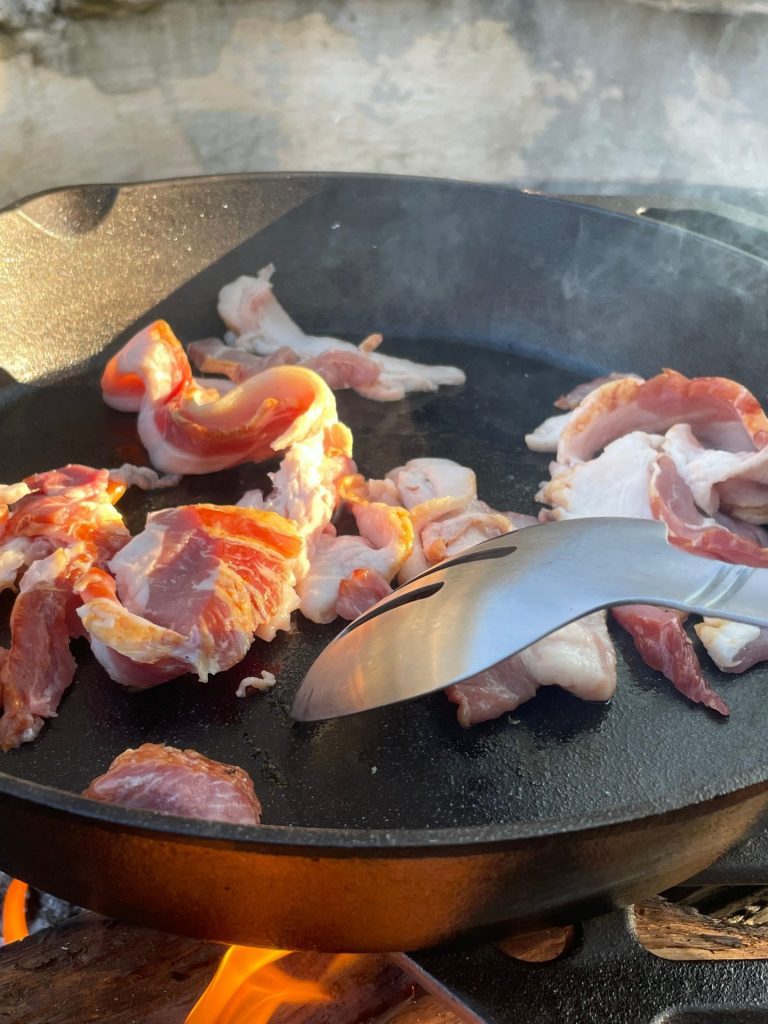
There are some finicky types of “non-stick” cookware that don’t respond well to certain implements.
How about a naturally non-stick pan that you can use anything you want on, even a fire poker?
Have a go at it. You can use metal cooking utensils on cast iron camp cookware and it will ask you for more abuse.
Use pokers, forks, wooden spatulas, steel forks, whatever you want. The cast iron will be fresher at the end of it than you are.
It’s Tougher Than You and Everyone You’ve Ever Known, or Even Heard About
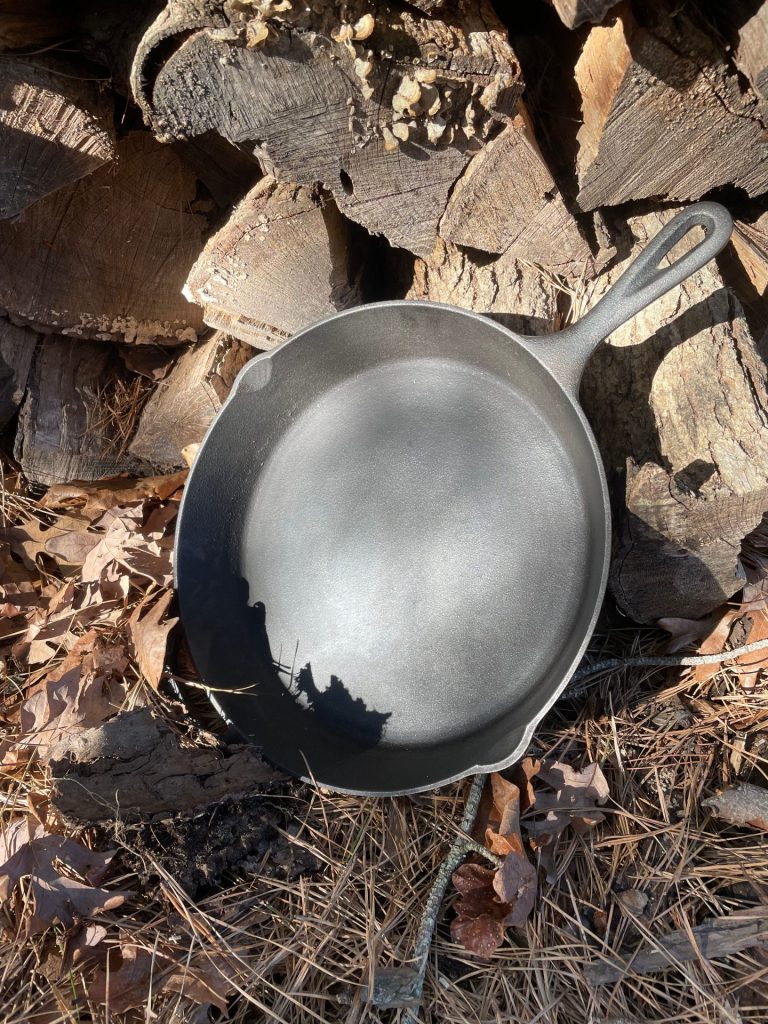
Cast iron is one of those things that refuses to change with the times, and if you were made of iron as cast iron (literally) is, maybe you’d be loath to change, too.
This is technology that does not go obsolete or change with the times because it is immune to obsolescence and already optimized.
Cast iron cookware is tougher than you are. It is tougher than I am. It is tougher than any tool you have ever handled and it is tougher than any character you’ve ever read dredged up from the dusty annals of history.
You can drop cast iron out of the back of your car or throw it down a hill. It’s not going anywhere.
Even if you let your cast iron rust over, with a bit of sandpaper and some steel wool you can bring it back to sparkling, shiny life.
That’s how tough cast iron is.
And, when you do take care of it properly, it’s the sort of thing you’ll be able to hand down to someone. It will last for generations and generations.
You Can Do Anything with It
Another great thing about cast iron is that it is amazingly versatile as a cooking implement. There is basically nothing you can’t do with it.
With a single cast iron skillet, you can sear, smoke, deep fry, bake, and sauté. Even without any fancy tools or features.
Of course, there are also cast iron griddles and woks and dutch ovens. These are even more specialized and make niche cooking applications much easier.
But my point stands. There’s not much if anything you can’t do with cast iron camp cookware.
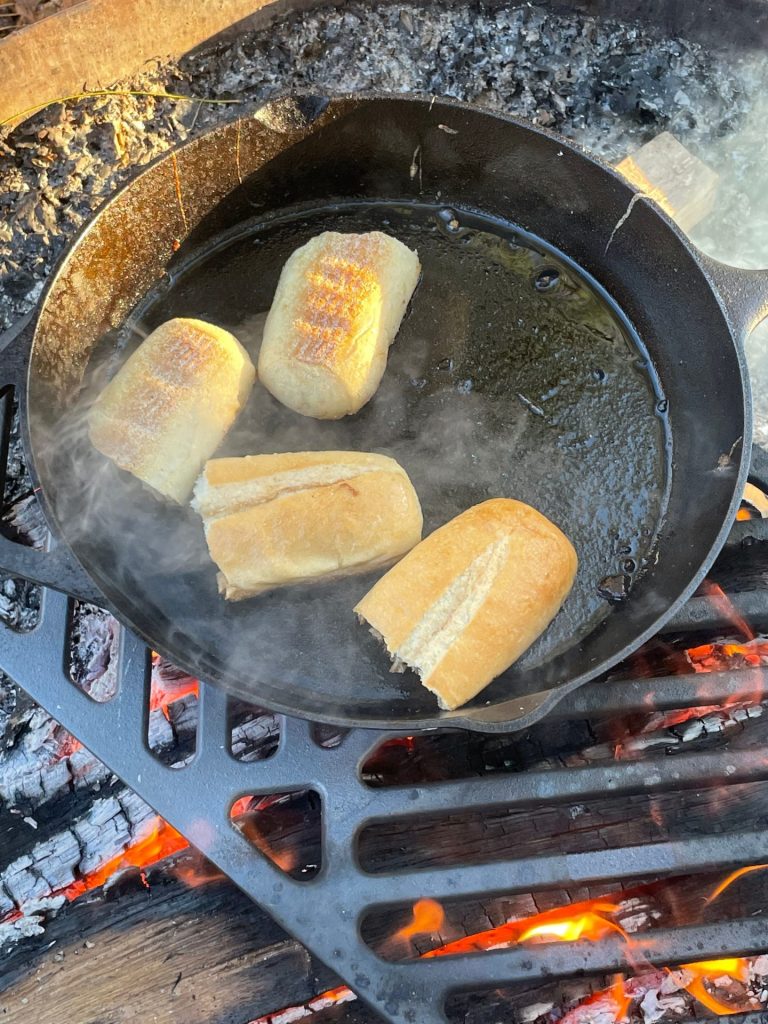
Now, to Address the Haters: Weight
SInce I have already addressed the flimsy, paltry complaint that you “can’t use soap” (cue the wringing of hands and gnashing of teeth) the only other conceptual disadvantage of cast iron camp cookware that I can possibly conjure is the weight.
Yes, cast iron is heavy. Iron is a dense element. This actually puts cast iron at a decided disadvantage, say, when you are backpacking and you can only carry so much weight.
I do cook on cast iron when I’m camping, but even I won’t stuff it in a pack. It is just too heavy to hike with it, and there are other ways to cook on the trail – such as with improvised skewers, or in aluminum foil packs.
But that’s basically it. If you’re cooking in camp and you drove your car to the site, or cooking over a fire in your backyard, or even more understandably, in your kitchen, then weight should never even register in your mind as a drawback.
Cast iron is too heavy to take on a 55 mile hike. It is not too heavy to move around a kitchen. If you can’t square with that, it’s called laziness.
And, since I have accepted the fact that cast iron is heavy, let’s just talk about a few other things that are heavy, too.
Gold is heavy. Silver is heavy. So are copper and platinum.
Need I go on?
Happy camping.
~The Eclectic Outfitter.
Very insightful article and 100% agree with all the points here. You can’t go wrong with iron. All that fancy teflon, non-stick flimsy cookware is just marketing.
I couldn’t agree more – but I think I already implicitly did in the post, didn’t I?
You made a lot of great points and I loved the video of the eggs freely moving around with a steel spatula – it really drove the point home about seasoned cast iron being non-stick and durable.
Glad you found it useful, now go out and get some cast iron.
Truth be told, until I started cooking heavily with cast iron I was skeptical myself about how great the non-stick properties are, but they just can’t be matched.